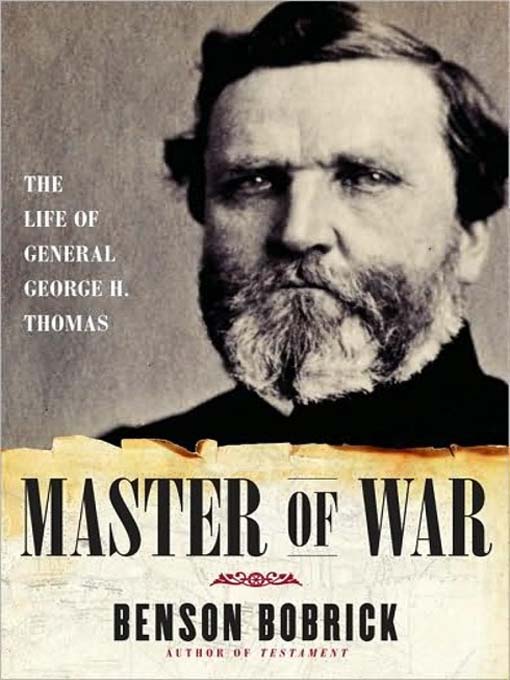Born in Virginia, Thomas survived Nat Turner's rebellion as a boy, then studied at West Point, where Sherman was a classmate. Thomas distinguished himself in the Mexican War and then returned to West Point as an instructor. When the Civil War broke out, Thomas remained loyal to the Union, unlike fellow Virginia-born officer Robert E. Lee (among others). He compiled an outstanding record as an officer in battles at Mill Springs, Perryville, and Stones River. At the Battle of Chickamauga, Thomas, at the time a corps commander, held the center of the Union line under a ferocious assault, then rallied the troops on Horseshoe Ridge to prevent a Confederate rout of the Union army. His extraordinary performance there earned him the nickname "The Rock of Chickamauga."
Promoted to command of the Army of the Cumberland, he led his army in a stunning Union victory at the Battle of Chattanooga. Thomas supported Sherman on his march through Georgia in the spring of 1864, winning an important victory at the Battle of Peachtree Creek. As Sherman continued on his March to the Sea, Thomas returned to Tennessee and in the battle of Nashville destroyed the army of Confederate general John Bell Hood. It was one of the most decisive victories of the war, and Thomas won it even as Grant was on his way to remove Thomas from his command. (When Grant discovered the magnitude of Thomas's victory, he quickly changed his mind.) Thomas died of a stroke in 1870 while still on active duty. In the entire Civil War, he never lost a battle or a movement.
Throughout his career, Thomas was methodical, careful, and always prepared. Unlike Grant at Shiloh, he was never surprised by an enemy. Unlike Sherman, he never panicked in battle but always remained calm and focused. He was derided by both men as "Slow Trot Thomas," but as Bobrick shows in this brilliant biography, he was quick to analyze every situation and always knew what to do and when to do it. He was not colorful like Grant and Sherman, but he was widely admired by his peers, and some, such as Grant's favorite cavalry commander, General James H. Wilson, thought Thomas the peer of any general in either army. He was the only Union commander to destroy two Confederate armies in the field.
Although historians of the Civil War have always regarded Thomas highly, he has never captured the public imagination, perhaps because he has lacked an outstanding biographer—until now. This informed, judicious, and lucid biography at last gives Thomas his due.
-
Creators
-
Publisher
-
Release date
March 23, 2009 -
Formats
-
OverDrive Listen audiobook
- ISBN: 9781400191581
- File size: 419148 KB
- Duration: 14:33:13
-
-
Languages
- English
-
Reviews
-
AudioFile Magazine
During the Civil War, General George H. Thomas won battles less bloodily than Generals Grant and Sherman, but he does not have their historical stature today. Benson Bobrick clearly plays advocate for Thomas, and Norman Dietz's narration reflects that, adding enough indignation at Thomas's treatment by rivals Grant and Sherman to the otherwise straightforward historical account to make a strong case for the forgotten hero. Dietz creates a warm portrait of the quiet, dignified Thomas, letting the general's good-hearted personality come through with attention to personal anecdotes and details while concentrating on his military strategies and political travails. Dietz's narration successfully builds Bobrick's conclusion--that Thomas should have been recognized for his character and brilliance. J.S. (c) AudioFile 2009, Portland, Maine -
Publisher's Weekly
November 10, 2008
George Thomas remains one of the less studied and less appreciated Union generals in the Civil War. In the first full-scale biography for decades, historian Bobrick (Testament: A Soldier’s Story of the Civil War
) presents a Virginian who stood by his oath to the United States; a commander who saved Kentucky for the Union; brought the Army of the Cumberland out of disaster at Chickamaugua to glory at Missionary Ridge; and destroyed an entire Confederate army at Nashville. Bobrick describes Thomas as consistently victimized by generals Sherman and Grant, who created from whole cloth an enduring image of Thomas as slow to act and think. Bobrick makes a convincing case that the only time Thomas was “slow” was in retreating under fire. Above all, Thomas understood that the modern high-tech battlefield required not heroic inspiration but deliberate preparation. When the time was right, he acted with a decisiveness comparable among his contemporaries only to Prussia’s Helmuth von Moltke. Bobrick considers Thomas the greatest Union general. That remains open to argument, but he incontrovertibly stands in the 19th century’s first rank as a master of war. 16 pages of illus.; maps.
-
Formats
- OverDrive Listen audiobook
Languages
- English
Loading
Why is availability limited?
×Availability can change throughout the month based on the library's budget. You can still place a hold on the title, and your hold will be automatically filled as soon as the title is available again.
The Kindle Book format for this title is not supported on:
×Read-along ebook
×The OverDrive Read format of this ebook has professional narration that plays while you read in your browser. Learn more here.


